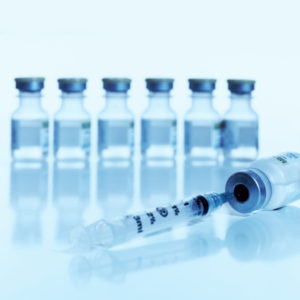Both the American Advisory Committee on Immunization Practices (ACIP) and the Canadian immunization guide recommend delaying live vaccine immunizations for 5 to 6 months after a RBC transfusion. Few studies, however, have examined whether donor antibodies (including vaccine antibodies) actually inhibit live vaccine immunogenicity in transfusion recipients. In order to determine the efficacy of the measles, mumps, rubella (MMR) vaccine in patients who have been chronically transfused, MMR antibodies were quantified in 25 pediatric patients (15 with sickle cell disease, 5 with B-thalassemia, 3 with Diamond-Blackfan anemia, and 2 with pyruvate kinase deficiency) who had received two doses of the MMR vaccine before the precautionary 6 months delay after RBC transfusion. Although lower than the 90% published immunogenicity rates for each of the vaccine components, most of the chronically transfused children still developed immune responses to the individual components of the MMR vaccine (68% for measles, 76% for mumps, and 68% for rubella) despite MMR antibody being present in the supernatant of the donated RBCs. Additional studies evaluating the immunogenicity of the MMR vaccine and other live immunizations in chronically transfused patients are needed.

